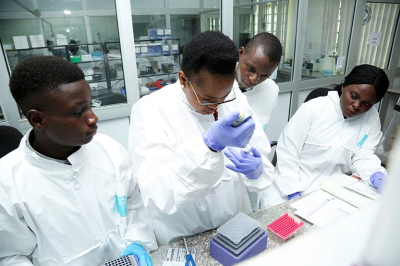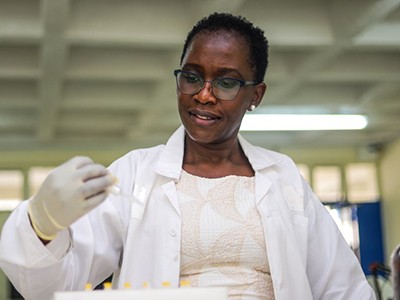Here in Nigeria, there have been interminable queues at fuelling stations nationwide for almost a year. I feel like a victim of robbery every time I buy petrol from the black market at twice the official rate. As a microbiology professor and working mother of four, I cannot navigate the chaos and long queues at the handful of stations that sell petrol at the government-approved price. Seared into my mind is the image of a brilliant engineer and a senior professor of medicine I know — whose time could be better spent doing research to improve people’s lives — queuing for hours outside a petrol station early on a Monday morning.
Usually, in the months ahead of general elections in Nigeria, elected leaders put on a semblance of governance to win votes. But now, even with the presidential and National Assembly elections this week, life in Africa’s most populous country is arguably harder than in any other peacetime period. Science could be part of the solution — yet seemingly has no advocate in these elections.
Chief among our woes is the current cash shortage, which came on the heels of record-high inflation of more than 20% in August and September last year. The Central Bank of Nigeria mandated a rushed swap of high-value naira banknotes with insufficient new notes, ostensibly to stymie illegal activities. This has caused chaos at banks and fights in ATM queues — a man even died of unknown causes while queuing to get his bank card. Many Nigerians, 40% of whom have no bank account, have no choice but to keep struggling to obtain scarce replacement banknotes.
Could Africa be the future for genomics research?
On top of this, fuel shortages and perennial electricity outages are coupled with deficient technology infrastructure. Buggy, unsafe banking applications mean that many people have had to return to the archaic process of queuing in banks for the most mundane financial transactions.
Science can’t immediately solve all our problems. But Nigerian politicians should heed the profound impact of investment in science and technology in countries such as South Korea and Malaysia. Our leaders need to break free of the trap of economic dependence on the export of commodities such as oil, minimize the activities of kleptomaniac bureaucrats and attract more investments to the science and technology sector. One of Nigeria’s biggest problems is what social scientists call the ‘resource curse’, an observation supported by many studies over the years (X. Sala-i-Martin and A. Subramanian J. Afr. Econ. 22, 570–615; 2013). In short, the discovery of oil has fuelled internal corruption and waste while stifling innovation.
But we do have home-grown advances in science and technology that can ameliorate some of these challenges. For instance, innovative Nigerians have invented solar-powered electric car,s and cookers that directly combust liquified natural gas that would help with the current petrol shortages and relieve the high cost of cooking fuel.
But the Federal Ministry of Science, Technology and Innovation has been unable to support commercialization of most of these inventions. This is not a surprise: the ministry’s allocation in the 2023 federal budget is about 0.85%, close to what it has been for much of the past decade.
Female scientists in Africa are changing the face of their continent
One consequence of this stagnation is that we are losing our best young scientists. I have grown tired of watching some of my best students emigrate to other countries for PhD programmes and job opportunities, frustrated by the absence of research facilities and flat-lining incomes in a time of hyperinflation. In 2009, the government agreed to improve salaries for researchers – but more than a decade on, it has still failed to follow through.
Yet there is a worrying absence of conversation around science in the current election campaigns. Two of the three front-runners for the presidency mention science and technology in their manifestos, but have no specific plans for boosting scientific research and innovation, either in the manifestos or on the campaign trail. This seems to be a mere box-ticking exercise. Politicians are not afraid to make big-ticket promises because the electorate rarely demands accountability, so the near-total silence on science, technology and innovation is a worrying harbinger of future neglect.
We must collaborate to pull science in Nigeria out of the cold. The Nigerian Academy of Science, because of its influence with the federal government, is best situated to draw the candidates’ attention to the frigid relationship between government and science. Other science-based non-governmental organizations and professional bodies should step up and advocate for basic science facilities, funds for salaries, local fabrication of equipment, and support for entrepreneurship. Affirmative action, childcare and other support for female scientists are also essential.
Scientists must step out of our campuses and laboratories more frequently to interact with the larger community. Last week, I joined some fellow academics for a conversation with local and federal politicians. I appeal to fellow scientists to make interactions like these a part of their work so that scientific issues are reckoned with, not just during election years but continually.
We need to harness our best minds to solve the mundane problems that have ground Nigeria to a near-halt. Science has to work for everyone in the country, so we don’t continue wasting millions of hours simply waiting in line for basic needs, such as petrol.
Competing Interests
The author declares no competing interests.



